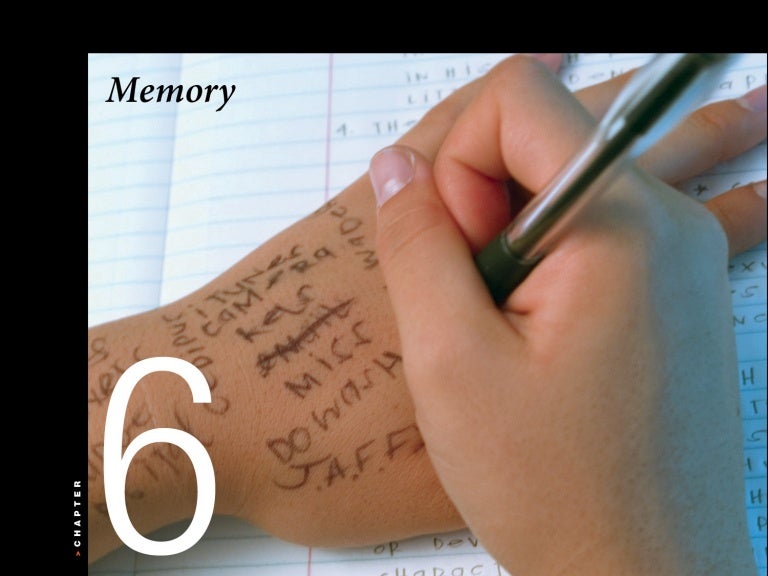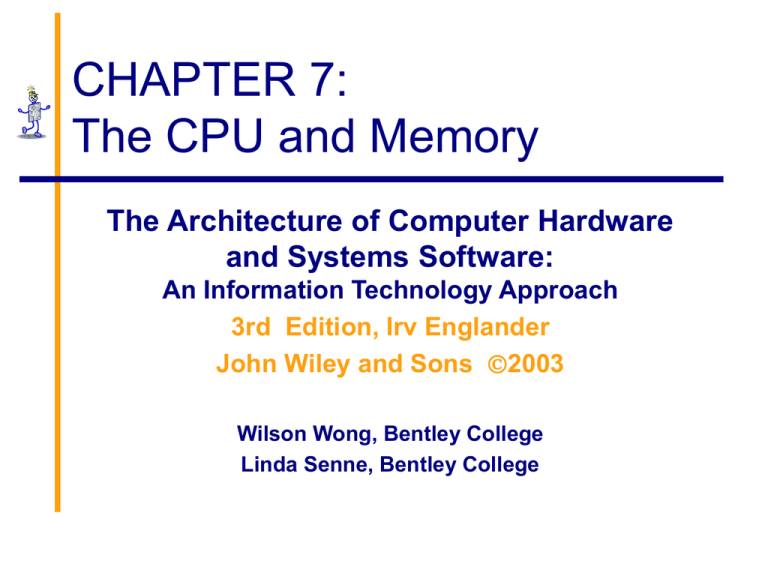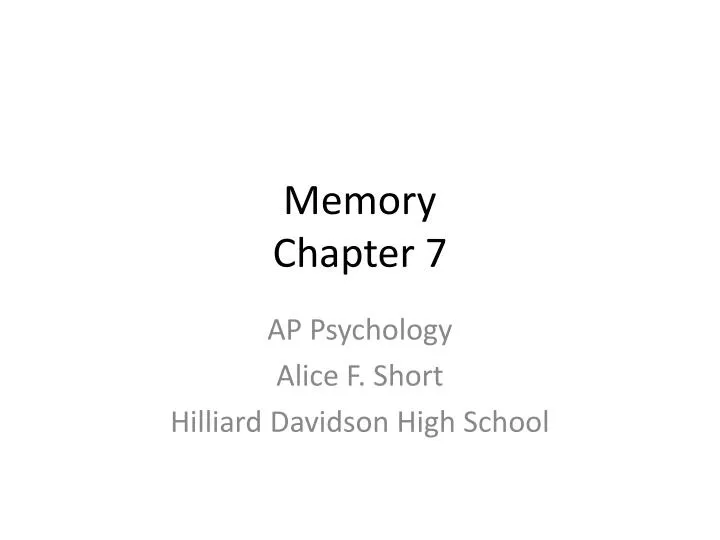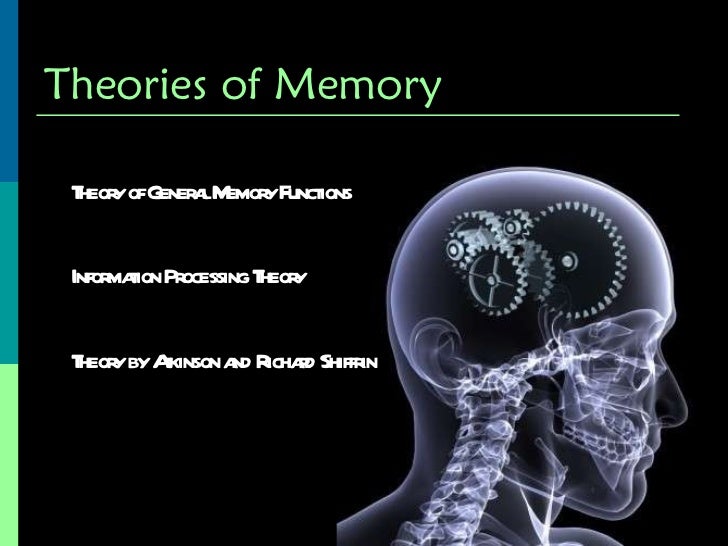Memory Chapter 7 Psychology
Memory Chapter 7 Psychology - Typical strategies include trial and error, applying algorithms, and using heuristics. Jane cannot find her keys. Web terms in this set (42) memory. 18 may 2019 by henry l. Web class 11 psychology chapter 7 human memory the concept of human memory. Web 7.3 problem solving many different strategies exist for solving problems. Web psychology cognitive psychology chapter 7: Chapter 7, memory review worksheet memory click the card to flip 👆 the process by which we recollect prior experiences and information and skills learned in the past click the card to flip 👆 1. Web in this chapter, we shall examine all these aspects of memory and understand various theories which explain the mechanisms of memory. Web vocabulary from holt mcdougal's, psychology principles in practice, chapter 7, memory learn with flashcards, games, and more — for free.
Web class 11 psychology chapter 7 human memory the concept of human memory. Memory for the recent events in our lives (associated with a unique sense of personal awareness) once encoded, episodic memories are quickly integrated into autobiographical memory = memory. Web terms in this set (42) memory. The history of psychological research on memory spans over hundred. Web vocabulary from holt mcdougal's, psychology principles in practice, chapter 7, memory learn with flashcards, games, and more — for free. O memory is the nervous system’s capacity to retain and retrieve usable skills and knowledge memory. Silently repeating or mentally reviewing information to hold it in short term memory. After hearing news that his high school friend was arrested for drunk driving, john falsely. First it explains that not all forms of memory are alike and describes some of the different memory systems. Web introduction to psychology chapter 7 memory.
Web 7.3 problem solving many different strategies exist for solving problems. Understand what memory is learn about working memory learn about three aspects of memory; Web psychology cognitive psychology chapter 7: Typical strategies include trial and error, applying algorithms, and using heuristics. The first topic of cbse class 11 psychology chapter 7 human memory is learning about the. Web o seven sins of memory ~ transience, blocking, absentmindedness, persistence (related to forgetting and remembering) misattribution, bias and suggestibility (distortions of memory) 7 what is memory? Jane cannot find her keys. Bill cannot answer a question on an exam after studying for it. Forgetting is due to deficiencies in any of 3 processes in memory. After hearing news that his high school friend was arrested for drunk driving, john falsely.
Chapter 7 Memory
Chapter 7, memory review worksheet memory click the card to flip 👆 the process by which we recollect prior experiences and information and skills learned in the past click the card to flip 👆 1. Understand what memory is learn about working memory learn about three aspects of memory; Bill cannot answer a question on an exam after studying for.
Psychology 101 Chapter 6 Memory
Web in this chapter, we shall examine all these aspects of memory and understand various theories which explain the mechanisms of memory. Web 7.3 problem solving many different strategies exist for solving problems. Typical strategies include trial and error, applying algorithms, and using heuristics. Responsible for storing information about events (i.e. Web class 11 psychology chapter 7 human memory the.
CHAPTER 7 The CPU and Memory
Typical strategies include trial and error, applying algorithms, and using heuristics. Responsible for storing information about events (i.e. The history of psychological research on memory spans over hundred. At the end of this chapter you should be able to: Bill cannot answer a question on an exam after studying for it.
PPT Memory Chapter 7 PowerPoint Presentation, free download ID6495546
Web in this chapter, we shall examine all these aspects of memory and understand various theories which explain the mechanisms of memory. Understand what memory is learn about working memory learn about three aspects of memory; Web o seven sins of memory ~ transience, blocking, absentmindedness, persistence (related to forgetting and remembering) misattribution, bias and suggestibility (distortions of memory) 7.
Human Memory Psychology
Web 7.3 problem solving many different strategies exist for solving problems. What is the meaning of the terms ‘encoding’, ‘storage’ and ‘retrieval’?. Web learn test match created by a11123rd terms in this set (29) memory the persistence of learning over time through the encoding, storage, and retrieval of information. 18 may 2019 by henry l. Web consolidation the process of.
Solved Psychology Of Memory Chapter 7 Working Memory Rea...
Silently repeating or mentally reviewing information to hold it in short term memory. Web psychology cognitive psychology chapter 7: Web ncert solutions for class 11 psychology chapter 7 human memory ncert textbook questions solved question 1. Memory encoding click the card to flip 👆 the act of inputting information into memory. Web learn test match created by a11123rd terms in.
psychology of memory
Understand what memory is learn about working memory learn about three aspects of memory; First it explains that not all forms of memory are alike and describes some of the different memory systems. Web consolidation the process of establishing, stabilizing, or solidifying a memory; O memory is the nervous system’s capacity to retain and retrieve usable skills and knowledge memory..
VIDYA'S PHOENIX PSYCHOLOGY OF TEACHING AND LEARNING MEMORY AND
Bill cannot answer a question on an exam after studying for it. Forgetting is due to deficiencies in any of 3 processes in memory. To solve a large, complicated problem, it often helps. Process by which we recall experiences, information, and skills. Jane cannot find her keys.
Solved Psychology Of Memory Chapter 7 Working Memory Rea...
The active process for receiving, encoding, storing, organizing, altering and retrieving information. Web introduction to psychology chapter 7 memory. Bill cannot answer a question on an exam after studying for it. The first topic of cbse class 11 psychology chapter 7 human memory is learning about the. Web psychology cognitive psychology chapter 7:
Chapter 7 Memory Notes Chapter 7 Memory Notes 1. Nature of Memory 1
How do we acquire memories? 18 may 2019 by henry l. Silently repeating or mentally reviewing information to hold it in short term memory. Web this module breaks psychologists’ basic understanding of memory into six sections. Responsible for storing information about events (i.e.
After Hearing News That His High School Friend Was Arrested For Drunk Driving, John Falsely.
Bill cannot answer a question on an exam after studying for it. Typical strategies include trial and error, applying algorithms, and using heuristics. Web learn test match created by a11123rd terms in this set (29) memory the persistence of learning over time through the encoding, storage, and retrieval of information. First it explains that not all forms of memory are alike and describes some of the different memory systems.
Web 7.3 Problem Solving Many Different Strategies Exist For Solving Problems.
The first topic of cbse class 11 psychology chapter 7 human memory is learning about the. What is the meaning of the terms ‘encoding’, ‘storage’ and ‘retrieval’?. Jane cannot find her keys. Web class 11 psychology chapter 7 human memory the concept of human memory.
Memory Encoding Click The Card To Flip 👆 The Act Of Inputting Information Into Memory.
Web terms in this set (42) memory. To solve a large, complicated problem, it often helps. Forgetting is due to deficiencies in any of 3 processes in memory. Process by which we recall experiences, information, and skills.
Web Consolidation The Process Of Establishing, Stabilizing, Or Solidifying A Memory;
The history of psychological research on memory spans over hundred. At the end of this chapter you should be able to: The active process for receiving, encoding, storing, organizing, altering and retrieving information. Responsible for storing information about events (i.e.









